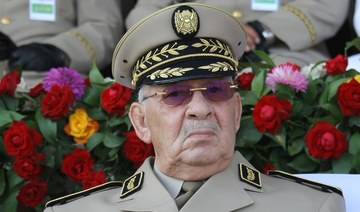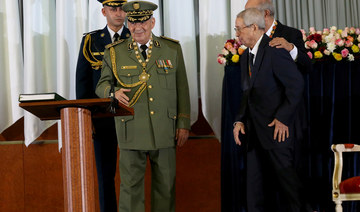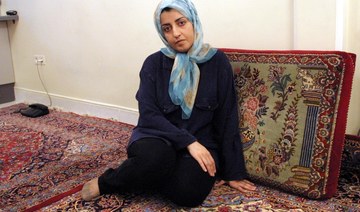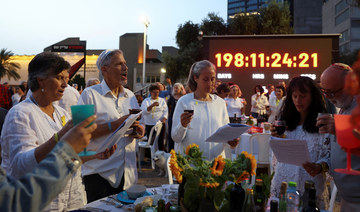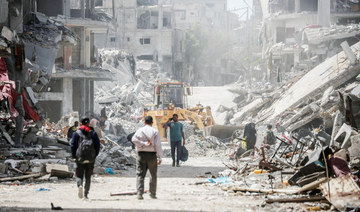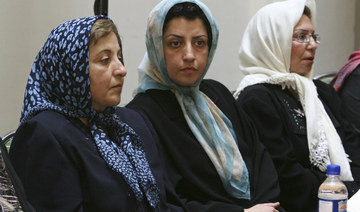ALGIERS: Algeria on Wednesday buried army chief Ahmed Gaid Salah, who had been the country’s de facto strongman in recent months and guardian of the ruling system challenged by a massive protest movement.
The veteran head of the armed forces died suddenly of a heart attack on Monday aged 79, days after overseeing the installation of a replacement for former president Abdelaziz Bouteflika, who resigned under pressure from huge street protests in April.
The military high command wields low-key but major influence in a ruling system in place since Algeria’s 1962 independence from France, and Gaid Salah’s death threatens to deepen the country’s political crisis at the end of a turbulent year.
His funeral was worthy of a national leader and came days after newly sworn-in President Abdelmadjid Tebboune presented him with the National Order of Merit, an award usually reserved for heads of state.
Tebboune had announced three days of national mourning but protesters defied that on Tuesday, hitting the streets with the same mass protests that have rocked the country since February.
The new president, along with senior political and military officials, held a ceremony Wednesday at the People’s Palace in central Algiers to pay their respects to Gaid Salah, who served a record 15 years as military chief of staff.
Military officers carried the coffin, draped in an Algerian flag, to the 18th century Ottoman building where it was received by the deceased general’s interim successor Said Chengriha.
Gaid Salah’s body lay in state for four hours as dignitaries and small groups of civilians entered the palace complex to pay their respects.
The funeral procession then set off on the 10-kilometer (six-mile) journey to the capital’s Al-Alia cemetary, state TV showed.
While only a few civilians entered the complex, thousands of people thronged outside the palace, along the procession route and at the gates of the cemetery, in numbers rarely seen for an official funeral.
The coffin was then placed on a gun carriage, pulled by an armored personnel carrier to cries of “Allahu akbar” (God is Greatest) and ululations from the crowd.
The convoy was led through vast crowds by officers in ceremonial uniforms on the back of a lorry, flanked by police motorcycle outriders.
While many paid tribute to Gaid Salah on Wednesday, he had been met with fierce criticism by the protest movement.
The mass demonstrations were sparked by veteran president Bouteflika’s February announcement that he would seek a fifth term in office.
Despite his departure in April, protesters have pressed on ever since, demanding an overhaul of the ruling system and the departure of establishment figures — including Gaid Salah.
The general had been instrumental in pushing through a December 12 election for Bouteflika’s successor, despite massive pushback from protesters who wanted to see deep-rooted reforms before any poll.
But crowd at the palace on Wednesday morning chanted a modified version of a protest slogan that called Gaid Salah a traitor, instead crying: “Army and people are brothers and Gaid Salah is a martyr!“
His wooden coffin was lowered into the ground at Al-Alia cemetery, where former presidents and other prominent Algerian figures are laid to rest, to a rendition of “The Last Post” and a gun salute, as senior political and military officials stood by.
The ceremony was broadcast live on state TV, with an image of Gaid Salah in a corner of the screen bearing the words “Farewell Lion of Algeria.”
In a eulogy at the graveside, defense ministry communications chief General Boualem Madi hailed Gaid Salah as “a hero” of Algeria.
“Not a drop of blood was shed and he steered Algeria back to safe harbor,” he said, referring to the army’s handling of the protest movement and of recent elections.
“God preserved his life until his mission was accomplished.
Hundreds of thousands turn out to mourn Algeria’s powerful army chief
https://arab.news/jktpp
Hundreds of thousands turn out to mourn Algeria’s powerful army chief
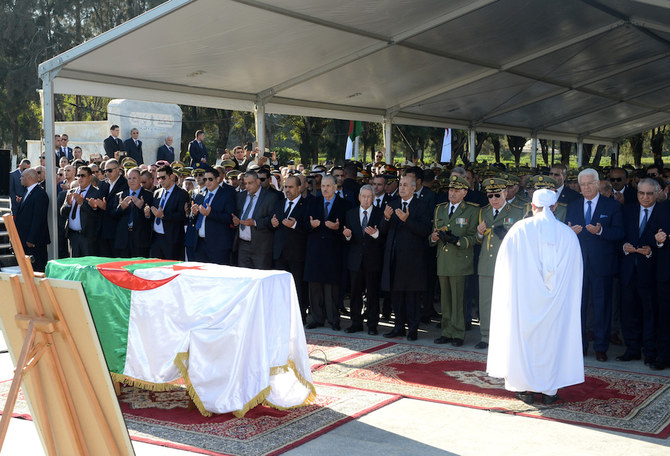
- Gaid Salah, who masterminded the state’s response to mass protests this year, died of a heart attack aged 79
- Mourners gave him credit for the army’s largely restrained response to mass demonstrations that rocked cities across the country
Tent compound rises in Khan Younis as Israel prepares for Rafah offensive
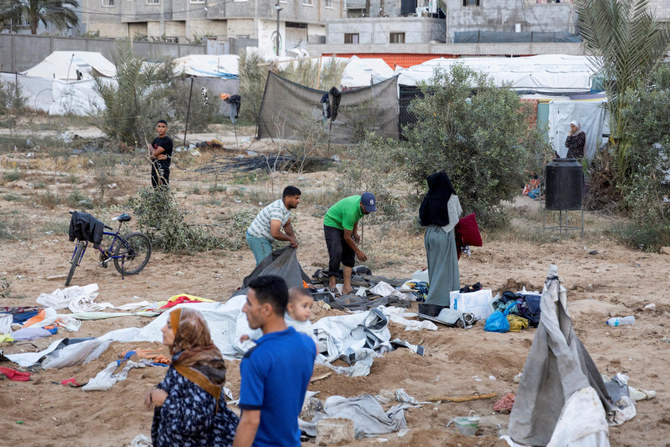
- Israel has said it plans to evacuate civilians from Rafah during an anticipated offensive on the southern city
- The Israel-Hamas war has killed more than 34,000 Palestinians
The tent construction is near Khan Younis, which has been targeted by repeated Israeli military operations over recent weeks. Israel has said it plans to evacuate civilians from Rafah during an anticipated offensive on the southern city, where hundreds of thousands of people have taken refuge during the war, now in its seventh month.
Also Monday, a failed rocket strike was launched at a base housing US-led coalition forces at Rumalyn, Syria, marking the first time since Feb. 4 that Iranian-backed militias have attacked a US facility in Iraq or Syria, a US defense official said. No personnel were injured in the attack, and no group has claimed responsibility for the attack.
The conflict has sparked regional unrest pitting Israel and the US against Iran and allied militant groups across the Middle East. Israel and Iran traded fire directly this month, raising fears of all-out war.
The war was sparked by the unprecedented Oct. 7 raid into southern Israel in which Hamas and other militants killed around 1,200 people, mostly civilians, and abducted around 250 hostages. Israel says militants are still holding around 100 hostages and the remains of more than 30 others.
The Israel-Hamas war has killed more than 34,000 Palestinians, according to local health officials, at least two-thirds of them children and women. It has devastated Gaza’s two largest cities and left a swath of destruction. Around 80 percent of the territory’s population have fled to other parts of the besieged coastal enclave.
The US House of Representatives approved a $26 billion aid package on Saturday that includes around $9 billion in humanitarian assistance for Gaza, which experts say is on the brink of famine, as well as billions for Israel. The US Senate could pass the package as soon as Tuesday, and President Joe Biden has promised to sign it immediately.
Iran’s foreign minister calls EU sanctions ‘regrettable’
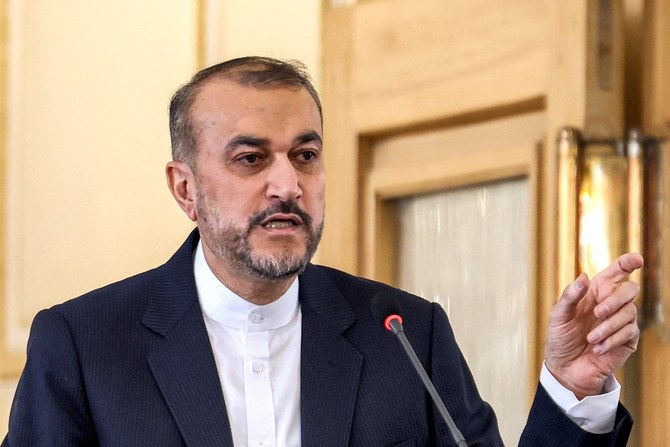
- EU foreign ministers agreed in principle to expand sanctions on Iran by agreeing to extend restrictive measures on Tehran’s weapons exports
DUBAI: European Union sanctions announced following Iran’s attack against Israel are “regrettable” because the country was acting in self-defense, Iran’s Foreign Minister Hossein Amirabdollahian posted on X on Tuesday.
Iran launched more than 300 drones and missiles on Israel in what it said was retaliation against a suspected Israeli bombing of its embassy compound in Damascus.
On Monday, EU foreign ministers agreed in principle to expand sanctions on Iran by agreeing to extend restrictive measures on Tehran’s weapons exports of any drone or missile to Iranian proxies and Russia.
“It is regrettable to see the EU deciding quickly to apply more unlawful restrictions against Iran just because Iran exercised its right to self-defense in the face of Israel’s reckless aggression,” Amirabdollahian said on X, before calling on the EU to apply sanctions on Israel instead.
More work will need to follow in Brussels to approve a legal framework before the expansion of the sanctions can take effect.
Israel’s Gaza war has negatively impacted human rights, says US report

- Rights issues include credible reports of unlawful killings, enforced disappearances and torture, says report
- Israeli military's conduct has come under scrutiny as its forces have killed over 34,000 in Gaza since Oct. 7
WASHINGTON: The war between Israel and Hamas that has killed tens of thousands of Palestinians in Gaza and resulted in a severe humanitarian crisis has had “a significant negative impact” on the human rights situation in the country, the US State Department said in its annual report on Monday.
Significant human rights issues include credible reports of arbitrary or unlawful killings, enforced disappearance, torture and unjustified arrests of journalists among others, said the State Department’s 2023 Country Reports on Human Rights Practices.
The report added that the Israeli government has taken some credible steps to identify and punish the officials who may have been involved in those abuses.
Israel’s military conduct has come under increasing scrutiny as its forces have killed 34,000 Palestinians in Gaza, according to the enclave’s health authorities, many of them civilians and children. The Israeli-occupied Gaza Strip has been reduced to a wasteland, and extreme food shortages have prompted fears of famine.
Israel launched its assault in response to a Hamas attack on Oct. 7, in which Israel says 1,200 people were killed.
Rights groups have flagged numerous incidents of civilian harm during the Israeli army’s offensive in Gaza, as well as raised alarm about rising violence in the Israeli-occupied West Bank, where Palestinian Health Ministry records show Israeli forces or settlers have killed at least 460 Palestinians since Oct. 7. But so far the Biden administration has said it has not found Israel in breach of international law.
Washington gives $3.8 billion in annual military assistance to its longtime ally. Leftist Democrats and Arab American groups have criticized the Biden administration’s steadfast support for Israel, which they say provides it with a sense of impunity.
But this month, President Joe Biden for the first time threatened to condition support for Israel, and insisted that it take concrete steps to protect humanitarian aid workers and civilians.
Israel’s Gaza war has negatively impacted human rights, says US report
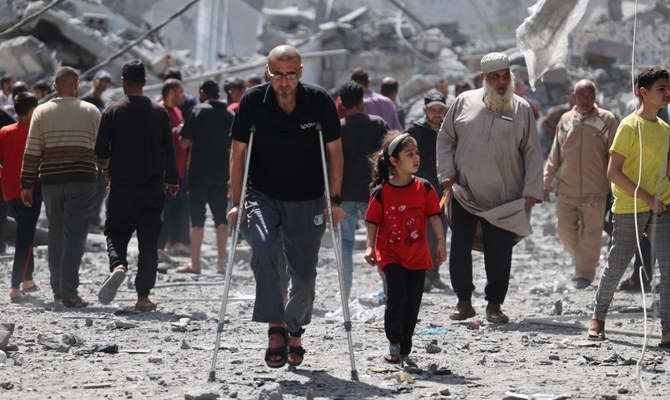
- The Israeli-occupied Gaza Strip has been reduced to a wasteland, and extreme food shortages have prompted fears of famine
WASHINGTON: The war between Israel and Hamas that has killed tens of thousands of Palestinians in Gaza and resulted in a severe humanitarian crisis has had “a significant negative impact” on the human rights situation in the country, the US State Department said in its annual report on Monday.
Significant human rights issues include credible reports of arbitrary or unlawful killings, enforced disappearance, torture and unjustified arrests of journalists among others, said the State Department’s 2023 Country Reports on Human Rights Practices.
The report added that the Israeli government has taken some credible steps to identify and punish the officials who may have been involved in those abuses.
Israel’s military conduct has come under increasing scrutiny as its forces have killed 34,000 Palestinians in Gaza, according to the enclave’s health authorities, many of them civilians and children. The Israeli-occupied Gaza Strip has been reduced to a wasteland, and extreme food shortages have prompted fears of famine.
Israel launched its assault in response to a Hamas attack on Oct. 7, in which Israel says 1,200 people were killed.
Rights groups have flagged numerous incidents of civilian harm during the Israeli army’s offensive in Gaza, as well as raised alarm about rising violence in the Israeli-occupied West Bank, where Palestinian Health Ministry records show Israeli forces or settlers have killed at least 460 Palestinians since Oct. 7. But so far the Biden administration has said it has not found Israel in breach of international law.
Washington gives $3.8 billion in annual military assistance to its longtime ally. Leftist Democrats and Arab American groups have criticized the Biden administration’s steadfast support for Israel, which they say provides it with a sense of impunity.
But this month, President Joe Biden for the first time threatened to condition support for Israel, and insisted that it take concrete steps to protect humanitarian aid workers and civilians.
Nobel laureate urges protest against Iran’s ‘war on women’
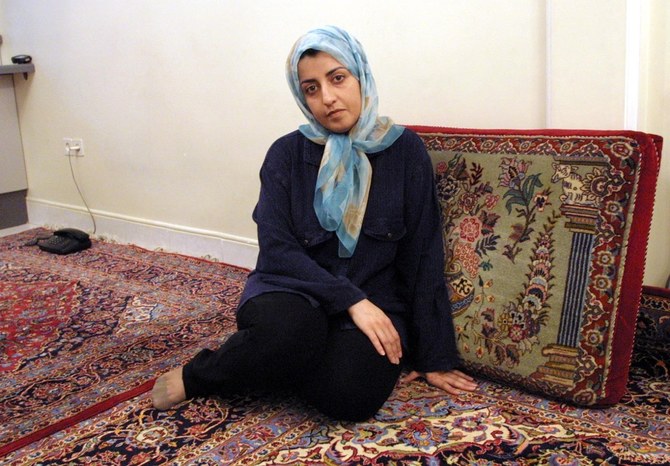
- Narges Mohammadi issues plea from Evin prison amid new crackdown by Tehran’s morality police
JEDDAH: Jailed Iranian Nobel laureate Narges Mohammadi urged Iranians on Monday to protest against the clerical regime’s “war against women” amid a new crackdown forcing women to cover their heads.
Mohammadi, who is being held in Evin prison in Tehran, called on Iranian women to share their stories of arrest and sexual assault at the hands of the authorities.
Iran launched a nationwide operation this month to enforce the wearing of the headscarf. Women have been arrested and taken to police stations by the morality police, and the Farsi hashtag meaning “war against women” has been trending on social media.
“People of Iran, I ask you, artists, intellectuals, workers, teachers, and students ... inside and outside the country to protest against this war against women,” Mohammadi said in a message from inside the prison. “Do not underestimate the power of sharing your experiences. Doing so will expose the misogynistic government and bring it to its knees.” She accused the authorities of bringing “a full-scale war against all women to every street in Iran.”
Mohammadi said she had been joined in jail by Dina Ghalibaf, a journalist and student who was arrested after accusing security forces on social media of putting her in handcuffs and sexually assaulting her during a previous arrest at a metro station. “For years, we have witnessed many women who have endured assault, abuse, and beatings by government agents,” Mohammadi said.
Mohammadi, 52, was awarded the Nobel Peace Prize last year in recognition of her campaign for human rights in Iran, which has led to her spending much of the past two decades in and out of jail. She has been imprisoned since November 2021 and has not seen her husband and twin children, who live in Paris, for several years.




